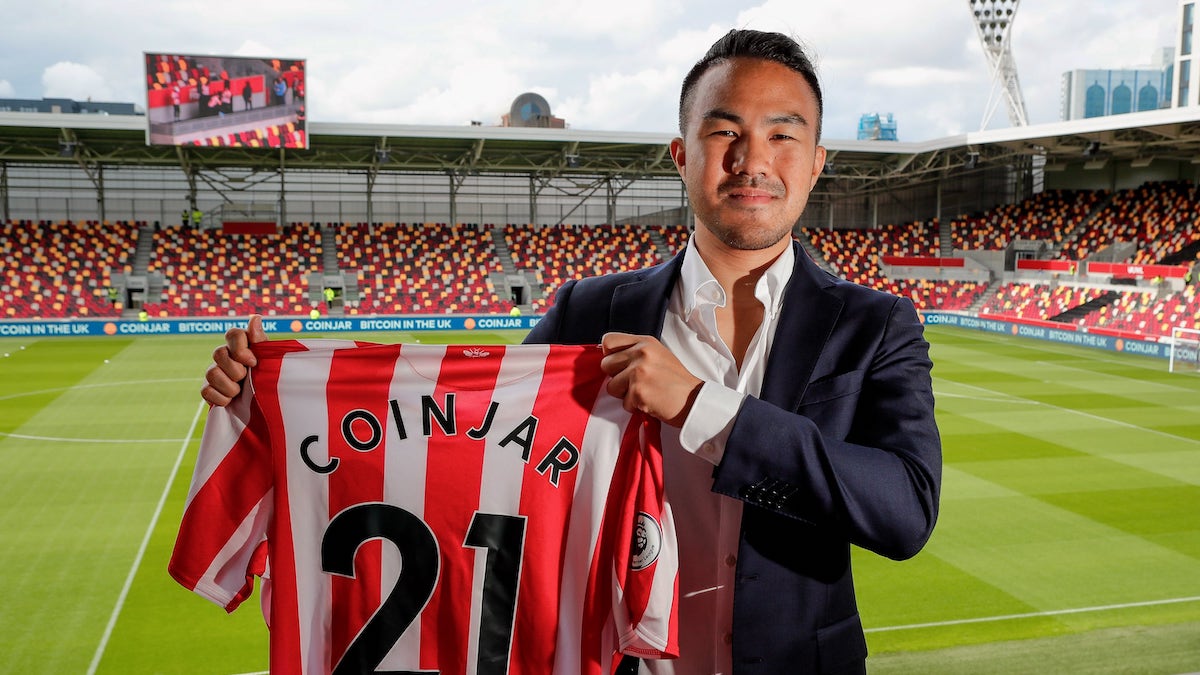Coinjar’s Asher Tan: ‘People say software is eating the world; I guess crypto is as well’

Coinjar CEO Asher Tan. (Supplied)
Asher Tan is the London-based chief executive of Coinjar, one of the longest-running digital currency exchanges in the world. It was founded in Melbourne back in May 2013, when Bitcoins were trading for around US$100 and the narrative around BTC revolved more around using it as a payments network, rather than saving it as “digital gold”.
Coinjar this month unveiled a crypto Mastercard and recently sponsored an English Premier League team, the Brentford Bees, which has pioneered a data-driven, “Moneyball“-like approach to English football.
Stockhead talked to the Malaysian-born, Perth-educated CEO last week as part of a series of occasional articles on the various hodlers, traders, developers and influencers that make up Australia and New Zealand’s cryptocurrency scene.
Stockhead: So I’m always interested to chat with different people, especially in the Australian crypto scene, just to see what they’re working on, what they have upcoming and what they see as happening in the space.
Tan: I guess it’s all happening right now, right? I think every facet of culture now is trying to figure out what crypto means for them — you have communities like sports, art, government. Everyone’s trying to figure out how this crypto thing applies to them. Both the technology, as well as the ethos, ownership structures, that sort of stuff.
Stockhead: Yeah … so tell me about Coinjar. Did you found it, or come on board later?
Tan: Yeah, I was there at the beginning. It was me and Ryan (Zhou, Coinjar’s chief operating officer), and one extra guy, he only lasted a couple of months. It’s been eight and a half years.
Stockhead: Wow…
Tan: And at the beginning, it was very much being a payments player, especially in Australia. It was trying to address the deficiency of the Australian payment system. Being able to transfer money instantaneously — I mean, up until recently, it took three days. ATM fees and all kinds of stuff.
I guess some elements of digitisation has made everything from getting a home loan, a personal loan, transferring money, a lot easier. And that was some of the battles that crypto enthusiasts also fought, on top of the whole founding ethos, about an alternative financial system.
I guess now we’re seeing that ethos evolve. There’s a huge chunk of the ecosystem which is mostly investment and wealth management focused.
The biggest exchanges in the world right now focus on many coins, many investment styles and trading products.
It’s not just crypto, since the rise of apps like Robinhood, in the last two, three years, especially, a lot of the energy has gone into this democratisation of investments.
I mean there are still groups pushing for advancing in payment and self-custody and stuff like that, but I think definitely it is primetime for traders and trading platforms. Coinjar has always always been a bit more about consumer usage.
At our heart, we always want to be objectively better — we don’t want just to make something that just exists with a crypto banner over it so can charge that extra percentage. We think we can actually do things better.
So I guess that’s where the product is right now, we’re trying to make it as usable and as functional for everyday use, but on the horizon, we do have more trading specific products coming up as well.
The way we see it, we’ve always had to have one to make the other. You can’t just have a trading product without any of the utility of the platform.
Crypto still is excellent for those relatively small purchases, instant purchases, buying digital goods online and smart contracts. The gateway has always been the Coinjar account and we’re extending the platform by adding more tools. I think that debit card recently has been a feature, but also more trading-specific tools towards the end of the year.
Stockhead: Trading specific tools — can you tell me about what kind of things you’ll be offering?
Tan: Yeah, I think the Coinjar experience is more for ease of use and utility and we’re looking at a mobile-specific interface for experience and more advanced traders as well.
Stockhead: Cool. And I read you started in Melbourne, and then kind of moved to London, can you tell me about that? I was reading something that it had to do with the Australian regulations or regulatory uncertainty?
Tan: Yeah, I mean, we started at the very beginning, before anyone knew what this was, or how it was gonna end up.
Stockhead: Sure.
Tan: I think early on, we were one of the very first venture capital-backed startups in the space. I think like top 10, maybe. We were really early in the wave. Our first major investor was Blackbird, co-founded by the Atlassian guys. And the lesson from Atlassian, Mike and Scott [Atlassian’s billionaire co-founders, Mike Cannon-Brookes and Scott Farquhar], was always ‘global from day one.’
And that’s sort of VC-fund strategy as well, global from day one.
Being a VC-funded company, there were always aspirations for us to be an international company.
Stockhead: Sure.
So I think that was sort of the impetus. It was just getting hard to operate in Australia, there was uncertainty about tax, uncertainty about banking. So it made sense to say, ‘Hey, let’s go overseas see if the market’s anymore welcoming in the UK.’
It wasn’t particularly, to be honest.
Stockhead: Oh really?
Tan: (Laughs) Yeah, each market has its issues, I guess. This was 2013, 2014. It was just hard to operate in the market here because it was just so early. We had a couple of people here in the UK. Never really launched a retail product in a proper manner.
We had some credit card deposits but no withdrawals, sort of a bare-bones infrastructure.
And after a while, I was like ‘hey let’s just go back, focus in Australia for a while, and when the time was right, I’ll do it properly, come in myself’. So (Coinjar relaunched in the UK in) May last year. It’s always too early, too late. How early is too early?
Stockhead: Sure.
Tan: Arguably, managed to catch a lot of energy from the bull run that we just had.
I guess the market’s really changed as well. I was speaking to an investor today, they just did a capital round, and this new exchange out of Austria, they’ve raised something like $500, $600 million already.
You’ve got raises like that, you’ve got FTX raising US$900 million. Although we were one of the early VC-backed companies I guess maybe by choice or by design, we decided to keep the current structure.
But I guess the market dynamics are also changing really quick. You see these well-funded crypto exchanges, you know challenger banks, even in the fintech space as well, so you have to ask yourself, where in the value chain do these companies sit?
I mean, even in Australia, crypto exchanges have outperformed all the neobanks.
You got one acquired by the Big Four. You got one or two closures. And I guess one or two sort-of stuck in limbo.
And I mean, even successes, such as Up selling to Bendigo, it’s probably still far away from the excitement of Afterpay/Square, or the big deals in the crypto market.
Australia does have a healthy exchange ecosystem — three, four exchanges which are relatively well-sized, similarly sized. And it’s healthy competition. So all these companies that haven’t raised massive sums are doing relatively well. Still working on the cutting edge.
So I think the fintech trends have come and gone. I think crypto niche specifically has shown resilience in both being able to adapt to regulation, markets and also, what the community wants.
It’s a much bigger community now, it’s not really about, ‘let’s take down the banks’. It might still be that, but the current view is expressed in a different way. It’s like maybe, ‘let’s become bigger than the banks’. Or you get all these community NFTs as well.
It’s different creators coming into what was maybe deemed as crowdfunding … 2014, 2015, there was a crowdfunding wave. Kickstarter started a new direction of products.
And that still exists but it’s even taken further from that. You know, how we express ourselves in art, in tokens and stuff like that.
People say, software is eating the world, I guess crypto is as well.
Stockhead: Yeah, yeah, it’s definitely interesting to watch what’s going on. Being a part of it, as an observer at least. Any kind of predictions on where things are going to go in the next couple of years?
Tan: Yeah, I think the intersection between fintech and crypto in credit … let’s talk about this Square and Afterpay thing. People remark, ‘Well, Square derives the majority of its revenue from crypto trading on the Square Cash App’. And they’re buying a buy now, pay later company.
You know, every company that touches retail consumers at a certain point has to figure out some sort of crypto strategy.
If one company does it I guess everyone’s gotta go it. And the question is, there are going to be good strategies and they’re going to be bad strategies.
Hopefully, governments, communities and regulators do pursue good strategies.
In a world where capital and talent and ideas can move getting pretty freely, people want to be beneficiaries of innovation. A stock market listing, a new protocol extension, some sort of improvements in lending and borrowing. All that’s on the cusp.
I guess we’ll see how, and what sort of companies make themselves most available to these changes. Right now it’s still the bigger fintechs: You’ve got your Revoluts, your Squares, your Afterpays sort of going into the crypto sector. I think Zip (ASX:Z1P) as well has mentioned some of these partnerships on the horizon.
So, excited to see how we continue to sort of merge with more mainstream fintech.
Stockhead: Do you think that there might be any consolidation in the market? I mean you were talking about the number of exchanges in Australia, there are a few, do see that is something where there could be consolidation?
Tan: I mean, it’s pretty typical of any market to see some consolidation.
I think it’s gonna get more competitive as well. It’s mostly based on fees right now.
Just parallels the share market trading platforms in Australia as well, it’s getting competitive. Obviously right now, it’s increasingly competitive on fees and even more than fees, maybe brand recognition.
Right now, the ground’s really fought who offers the most coins.
We’ve conservative on coin choice because there are unknowns and we’re trying to be objectively good for our customers, so we tend to limit the choices to those that we think could be useful from a consumer perspective.
There’s other platforms offer a lot more choice; that’s fine. But the battles of exchange sizes, specifically in Australia, is around that right now.
In terms of features, I don’t think there’s one key feature that one exchange has others don’t have. Maybe support service interface.
It’s still a very tiny market.
If you look at the addressable market of say, Buy Now, Pay Later, there’s five companies on ASX, two really big ones and a few medium-sized ones and again the crypto-community, it’s still a fraction of that.
As we move towards that size there’s going to be some consolidation as well, but I think increasingly competitive based on fees and think liquidity and product become more interesting.
And it’s massive compared to just a few years ago. When we went to an incubator, at Blackbird Ventures, we were in fund one with I believe seven other companies. They were $20 million funds. And I think right now it has something like $1.5 billion.
I think of our batch of seven or eight companies, there’s been three unicorns. Canva, Safety Culture. Maybe Culture Amp.
So I mean, if you look at the hit rate, everyone on ASX wants a 10-bagger, right? But even at that time, there was all this scepticism. I think we’ve shown that tech is still a growing sector, there’s a lot of valuable companies still to be created.
Stockhead: What drew you to crypto back then?
Tan: I think I was drawn to the startup scene, as much as I was crypto. It was the biggest problem there to be solved.
Getting into the incubator, I pitched a few ideas. The guys that told me they were all terrible, to come back with something else. And I remember just sitting there saying, ‘You need to come up with a better idea because you know we’ve got another pitch tomorrow, and I don’t really want to go back to work after this, right? This is so much more fulfilling.’
So we said ‘Hey, the guy said he heard something about Bitcoin.’
I think that was really started the idea of consumer cryptocurrency services, it sort of evolved from that; I mean, the goal is still the same.
I think you know we’ve probably seen the consumer section as the most crucial in crypto. It’s highly retail, it’s highly non-corporate. It’s a community movement. We always felt there were unaddressed gaps. Even today, even with billion-dollar companies around, I still feel that consumer crypto services are still catching up.
Yeah, we just decided that that was our niche.
It feels like a long time ago, eight and a half years, almost a decade. But I think things have just taken some time. It was not too long ago where this wasn’t really a topic or it wasn’t newsworthy.
It took a lot of time to convince people that you know publishing the story or doing a campaign with a cryptocurrency company,… even up until recently, doing partnerships with established firms, they’re still scared about the usual PR backlash, brand contamination with being associated with cryptocurrency. Some points are valid, some of them not so valid.
Stockhead: Yes… so anything else I should ask you or that people should know?
Tan: As an Australian living abroad … there’s some frustration about the isolationist nature of the economy.
You have crypto, which has no borders, and then all of this stuff happening in the midst of a pandemic.
You’ve got adoption, you’ve got people trying as ambitious as ideas as they were pursuing at the very beginning.
It’s an interesting dynamic of things. I guess it’s what living in the future looks like.
Slightly dystopian, with the pandemic, but I think some of the promises around where technology can take us is still happening.
—
This interview has been lightly edited for clarity.
The views, information, or opinions expressed in the interview in this article are solely those of the interviewee and do not represent the views of Stockhead. Stockhead has not provided, endorsed or otherwise assumed responsibility for any financial product advice contained in this article.
At Stockhead, we tell it like it is. While Coinjar is a Stockhead advertiser, they did not sponsor this article.
Related Topics
UNLOCK INSIGHTS
Discover the untold stories of emerging ASX stocks.
Daily news and expert analysis, it's free to subscribe.
By proceeding, you confirm you understand that we handle personal information in accordance with our Privacy Policy.








